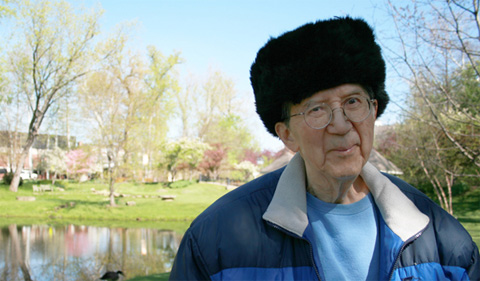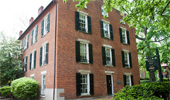Forty years ago there were very few women students or women faculty members in science and engineering fields at public universities—anywhere.
Dr. James Tong, Professor of Chemistry & Biochemistry at Ohio University, decided it was time to correct this stark imbalance.
In an era when most young women were not encouraged by their teachers, parents or the profession to pursue science and engineering careers, Tong began a 40-year effort to balance the number of women and men professionals. He created the Women In Science and Engineering (WISE) program, an annual event at Ohio University where female sixth grade, middle and high school students from around the region are invited to visit campus to experience and learn about fields as varied as forensic chemistry to clinical psychology. WISE participants spend the day attending demonstrations and talks by female faculty members and outstanding students about career opportunities in science and engineering.
For the last two years, WISE participants have attended the Ohio University Student Expo, held each April at the Convocation Center, as part of the program to interact with university peers conducting research.
“Jimmy and I wanted to add another dimension to the WISE program, encouraging the young women to interact with student researchers and inspiring them to imagine themselves in STEM careers,” says Roxanne Malé-Brune, Director of Student Expo, as well as director of grant development and projects in the Research Division.
A Steady Growth of Students
The first WISE event had around 50 participants, and Tong had trouble finding enough local female speakers. But slowly the event grew to have a steady 500 participants from around the region and more than 25 women speakers from Ohio University. Over the years several regional K-12 schools from Chillicothe, Lancaster, Zanesville, and elsewhere, as well as those in Athens County, have sent students to participate.
![“One of the best ways to discover science is to go OUTSIDE and just be CURIOUS,” writes Nicole Cavender, pictured here at the regional science fair in the early 1990s. She participated in WISE as a young person, won a scholarship at the regional science fair and went on to the International Science and Engineering Fair. [Photo: provided by James Tong]](https://www.ohio-forum.com/wp-content/uploads/2015/06/Nicole-Cavender.jpg)
“One of the best ways to discover science is to go OUTSIDE and just be CURIOUS,” writes Nicole Cavender, pictured here at the regional science fair in the early 1990s. She participated in WISE as a young person, won a scholarship at the regional science fair and went on to the International Science and Engineering Fair. [Photo: provided by James Tong]
Cavender learned some valuable lessons from Tong and other mentors about how to focus on success. “If you are passionate about math and science,” Cavender notes, “then you are on your way to a successful career. Don’t give it up. Passion is not something that can be taught very easily and it is often an essential ingredient to being successful.”
Faculty Engagement
Several Ohio University faculty presenters have been participating in the WISE program for a number of years, including Dr. Rebecca Barlag, Assistant Professor of Chemistry & Biochemistry.
“I think it is a great opportunity for girls to come and connect with my students and with female faculty members,” she says. “They need to see that they do have a support group of strong women.”
Although Barlag didn’t participate in WISE in her youth, she says that Tong played a pivotal role in encouraging her to stay on course in her university forensic chemistry program and later pursue a job in the department.
When asked why she participates each year in WISE, Barlag recalls an encounter she had with a 12-year-old student in the 2015 program.
“She said ‘I pretend to be less intelligent because I want boys to think that I am pretty.’ It killed me,” Barlag says. “I asked her if she thought that my students were pretty and she said ‘yes.’ I told her that they are very smart and that she could be both! I was really at a loss for words. I want to encourage women to work hard toward their goals, but to not have to sacrifice being beautiful and being women.”
Dr. Janet Duerr, an associate professor of biological sciences, views the WISE program as an opportunity to provide young women with tips for success. She encourages students in her session to seek support from their families or look to their peers and “near peers.” That is, other women who have made the next step in their careers who can share about how they made it in the discipline. These days, she adds, there are also resources such as the women’s center where they can go to get support and suggestions for how to deal with sexism.
“Research shows that there is still bias against women in these fields, whether conscious or not,” she says.
Diana Schwerha, an associate professor of industrial and systems engineering, has strong praise for Tong and his dedication each year to the WISE program. Schwerha brings her female engineering graduate students along to talk about their experiences and what they plan to do when they graduate. They help answer practical questions for WISE students, such as, “Why did you choose the career field?” and “How much money do people in certain careers make?”
A Continuing Need
Zane Trace High School Biology Teacher Jason Clark attended WISE for the first time this year and was impressed with how excited his students were about the physical therapy activities, forensics and engineering and paleontology lessons. “The trip to WISE included students that may have never been on a college campus before,” says Clark.
“The girls were able to meet and learn from experts in their fields,” he continues. “My students learned about career paths that they had not thought of and spent the day with the role-model presenters sending the message ‘look what you can do.’ I think attendance there was more authentic to my students than looking through a textbook written 15 years ago when they were born.”
Tong believes programs like WISE are needed to address not just a perception that STEM careers are off- limits to women but to address a shortcoming at the national level. Women remain underrepresented in the science and engineering workforce, although to a lesser degree than in the past, with the greatest disparities occurring in engineering, computer science and the physical sciences, according to the National Science Foundation.
Programs like WISE remain relevant today for a variety of reasons, Tong says.
“I saw a prejudice against young women who wanted to study science and technology. And 40 years later women are in school, yet nobody is telling them they can go into engineering if they want,” he says. “(Secondary education) teachers are overworked and can’t talk about careers; teachers are underpaid and have no time for outside events. WISE provides that bridge to making informed decisions about what is possible in a young woman’s life.”
After 30 years of presenting at WISE, Dr. Christine Gidycz, Professor of Psychology, agrees that it’s still incredibly important to attract smart young women to the sciences each year through programs like WISE.
“I think what is so nice about the program is that it has not really changed that much over the years,” Gidycz says. “This suggests to me that it was always, and continues to be, a program that is both needed and appreciated by the young women. And Dr. Tong has known for a long time that disciplines that do not strive for gender equity will never reach their full potential.”
—By Jean Andrews, Research Communications
The 2016 Ohio University WISE program and the Student Expo are scheduled for Thursday, April 14, 2016.




















Comments